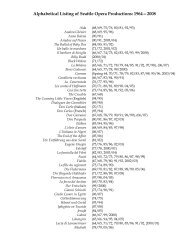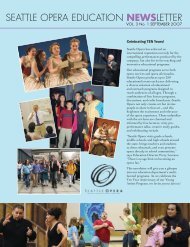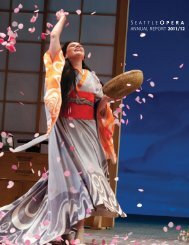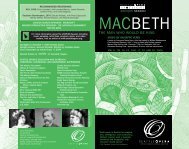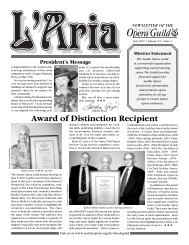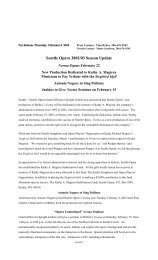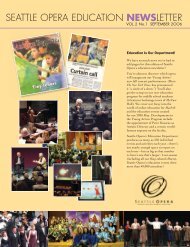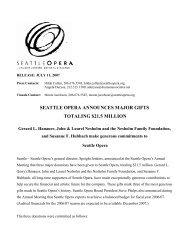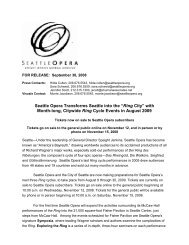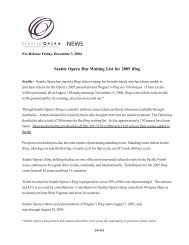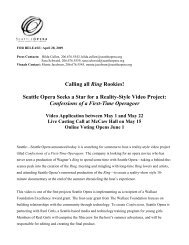You also want an ePaper? Increase the reach of your titles
YUMPU automatically turns print PDFs into web optimized ePapers that Google loves.
Aria Ready?<br />
spotlight on<br />
SUOR<br />
ANGELICA<br />
Maria Gavrilova, Angelica<br />
“Senza mamma”<br />
Angelica reacts to the news of<br />
her son’s death.<br />
Long Story Short<br />
After sin comes penitence and forgiveness for a<br />
loving mother.<br />
Who’s Who?<br />
Sister Angelica, who knows the powers of<br />
every herb in the convent’s garden, has been a<br />
nun for seven years—but has yet to find peace.<br />
The Princess, her wealthy aunt, likes to<br />
appear pious and noble, although really she is<br />
manipulative and cruel.<br />
Sister Genovieffa, who used to be a shepherdess,<br />
misses her darling little lambs.<br />
Sister Dolcina (“Sweet-Tooth”) likes to<br />
commit the sin of gluttony.<br />
The Abbess is trying to run a serious convent;<br />
no “Nunsense” here.<br />
Where and When?<br />
A convent in northern Italy, late seventeenth<br />
century.<br />
What’s Going On?<br />
For seven years Sister Angelica has led the quiet<br />
life of a nun. Not much happens at her convent:<br />
every so often special treats, such as currants,<br />
Music by Giacomo Puccini<br />
Libretto by Giovacchino FoRZano<br />
First performed New YoRK City, 1919<br />
In Italian with English Captions<br />
At <strong>Seattle</strong> <strong>Opera</strong> May 2013<br />
Production Sponsor ArtsFund<br />
come in with the donations of food; and once<br />
a year the sunlight through a certain window<br />
strikes the fountain and turns the water golden.<br />
The nuns follow a strict rule, and spend most of<br />
their time in prayer. And none of the other nuns<br />
really understands why Angelica is there.<br />
Born a princess, Angelica was forced to become<br />
a nun when she bore a child out of wedlock. The<br />
opera takes place the day Angelica finally receives<br />
a visit: it is her aunt, who needs her to sign<br />
some family documents. Angelica’s little sister<br />
will marry, the aunt explains; they have found<br />
a man who agrees to look past the shameful<br />
stain Angelica left on their once-glorious family<br />
name. But first Angelica must sign away her<br />
inheritance. Angelica is more interested in what<br />
became of her baby. “Two years ago he took<br />
sick,” her aunt responds. “Everything was done<br />
to save him, but....”<br />
Angelica signs her aunt’s document, and the old<br />
woman leaves her alone. Desiring more than<br />
anything to be with her son, she collects herbs<br />
from the convent garden, prepares poison, and<br />
drinks it. Suddenly realizing that in her desperate<br />
love she has committed a mortal sin, Angelica<br />
prays to the Virgin Mary, imploring salvation,<br />
and as she dies, she receives a sign of grace—a<br />
vision of her dead son.<br />
SO: Does your character change as she<br />
sings this aria?<br />
MG: Angelica starts the aria with sadness<br />
for both her child and herself, that they<br />
never knew each other’s love. At first<br />
she is sad (the aria begins in A Minor),<br />
imagining him dying alone and unloved.<br />
She then thinks that he is happy in<br />
heaven (changing to F Major), and<br />
thinks how happy she will be when they<br />
are together in heaven.<br />
SO: Do you remember the first time you<br />
heard this aria?<br />
MG: Yes, when I was a student in Moscow<br />
Conservatory, I heard Mirella Freni sing<br />
it on an EMI aria recording from the<br />
1960s. The performance I like the best<br />
is a video from La Scala with Rosalind<br />
Plowright. With both singers, I was<br />
impressed by how they used their voices<br />
in such a difficult aria with feeling.<br />
SO: What do you like most about<br />
singing this aria?<br />
MG: Angelica is a combination of sweetness<br />
and power.<br />
SO: What’s most challenging about it?<br />
MG: The pianissimi high notes in the aria are<br />
challenging and even more so at the<br />
end in the prayer that follows the aria.<br />
SO: After “Senza mamma,” you’re still<br />
the only one onstage. How is the<br />
rest of the opera different from the<br />
part that’s technically considered<br />
the aria?<br />
MG: After the aria, Suor Angelica loses her<br />
rational mind and is in ecstasy thinking<br />
about her son and herself in heaven.<br />
This music, not only the singing, but the<br />
orchestra too, is what we think of as<br />
real Puccini.<br />
2012/13 Season at <strong>Seattle</strong> <strong>Opera</strong> 31




